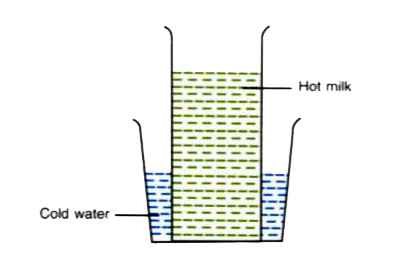A hot metallic piece is placed in tap water contained in a bucket. Heat will flow from ..............to..........
To solve the question, we need to understand the concept of heat transfer. Here’s a step-by-step solution:
Step 1: Identify the two objects involved
In this scenario, we have two objects:
- A hot metallic piece
- Tap water in a bucket
Hint: Think about the temperature of each object. Which one is hotter?
Step 2: Determine the temperature of each object
The metallic piece is described as "hot," meaning it has a higher temperature compared to the tap water, which is at a lower temperature.
Hint: Remember that heat flows from areas of higher temperature to areas of lower temperature.
Step 3: Understand the direction of heat flow
According to the laws of thermodynamics, heat always flows from a hotter object to a cooler object until thermal equilibrium is reached.
Hint: Consider which object has more thermal energy and which one has less.
Step 4: Conclude the heat flow direction
Since the metallic piece is hotter than the tap water, heat will flow from the metallic piece to the tap water.
Hint: Visualize the process: if you touch a hot metal, you can feel the heat transferring to your hand, which is cooler.
Final Answer
Heat will flow from the metallic piece to the water in the bucket.
---
In this scenario, we have two objects:
- A hot metallic piece
- Tap water in a bucket
The metallic piece is described as "hot," meaning it has a higher temperature compared to the tap water, which is at a lower temperature.
According to the laws of thermodynamics, heat always flows from a hotter object to a cooler object until thermal equilibrium is reached.
Since the metallic piece is hotter than the tap water, heat will flow from the metallic piece to the tap water.
Heat will flow from the metallic piece to the water in the bucket.
Topper's Solved these Questions
- HEATBOOK - ICSECHAPTER - HEATEXERCISE - TEST YOURSELF (MATCH THE COLUMN)
1 Videos
- HEATBOOK - ICSECHAPTER - HEATEXERCISE - TEST YOURSELF (SELECT THE CORRECT)
7 Videos
- HEATBOOK - ICSECHAPTER - HEATEXERCISE - TEST YOURSELF (TRUE OR FALSE)
13 Videos
- FORCE AND PRESSURE : MOTION BOOK - ICSECHAPTER - FORCE AND PRESSURE : MOTION EXERCISE - EXERCISES (SECTION II) (Picture Study)
4 Videos
- LIGHT ENERGYBOOK - ICSECHAPTER - LIGHT ENERGYEXERCISE - EXERCISE (PICTURE STUDY)
10 Videos
Similar Questions
A solid silver piece is immersed in water contained in a measuring cylinder. The level of water rises from 50 mL to 62 mL. Find the volume of silver piece.
View SolutionThe Fig. shows a glass tumbler containing hot milk which is placed in a tub of cold water. State the direction in which heat will flow.

View Solution
Knowledge Check
Water flows from the
Amore positive osmotic potential to the more negative water potentialBhigher water potential to the lower water potentialCmore positive water potential to the more negative water potentialDall of the aboveA metallic piece displaces water of volume 15 mL. The volume of piece is :
A15cm3B15m3C15×103cm−3D15×103cm3Marine fish when placed under tap water bursts, because of:
AEndosmosisBExosmosisCDiffusionDPlasmolysis
A copper piece of mass 88 g when immersed completely into water contained in a measuring cylinder, raises the level of water from 15 mL to 25 mL. Find the volume of copper piece
View SolutionWhich of the metal chloride is insoluble in cold water but dissolves in hot water ?
View SolutionA well stoppered thermos flask contains hot water .This is an example of
View SolutionIn a room containing air,, heat can go from one place to anther
View SolutionMarine fish when placed under tap water bursts, because of:
View Solution
